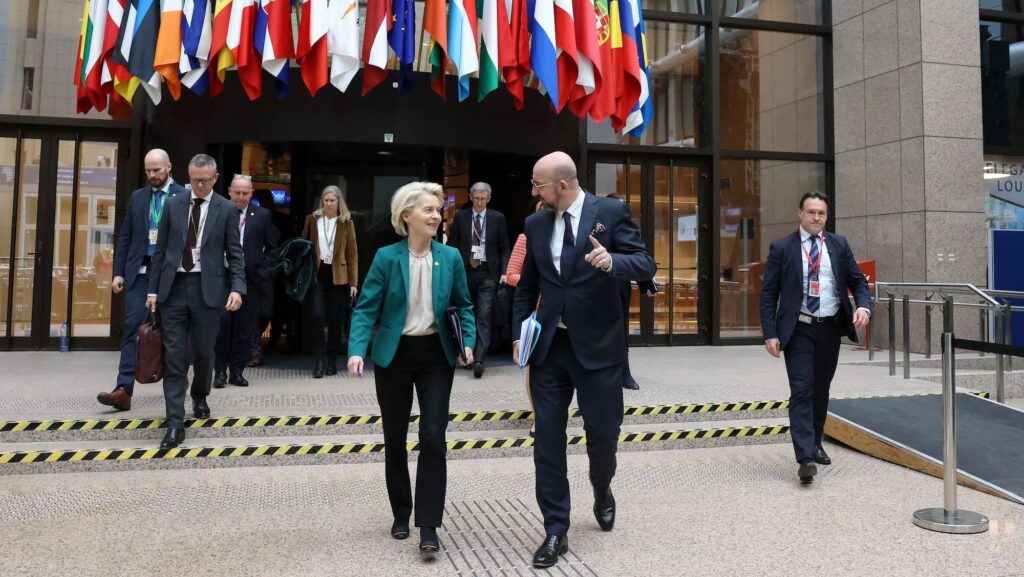
European Commission President Ursula von der Leyen and European Council President Charles Michel.
Photo: © European Union
Although declaring victory on Sunday night—without even standing as a candidate—Commission President Ursula von der Leyen might face more difficulty getting re-elected than she ever thought. Not only does she have less support in Parliament than five years ago, but her position as the winning EPP’s Spitzenkandidat also poses questions as to whether she could even attend the high-level negotiations about reshuffling the EU’s top positions, including hers.
In an informal conversation with EU leaders, European Council President Charles Michel has reportedly suggested that he’s considering banning von der Leyen from the Council meetings discussing who to nominate as the head of the EU institutions. She could not be impartial, after all, as she’s trying to get re-elected as Commission chief.
Ever since the creation of the Spitzenkandidat system in the Lisbon treaty—saying that EU leaders should first consider the lead candidate of the winning party for the top EU role—there has never been a Commission president running for re-election. The dilemma, therefore, is a legitimate one, even if the pro-von der Leyen camp is not amused by Michel’s proposal.
“Member states are increasingly irritated about Charles Michel’s role in the selection process for the Commission President,” one EU diplomat told Politico. “It seems to be driven by purely personal motives.”
There seems to be a consensus in Brussels that Michel wants to thwart von der Leyen’s second term just to deliver a final blow in the two leaders’ well-known historic rivalry, even if he doesn’t seem to be interested in replacing her at the helm of the Commission. The two presidents’ relationship has been cold for many years as they battled awkwardly for the head of the EU’s imaginary title. A prime example of this is the so-called sofagate scandal of 2021, when Michel on a trip to Ankara took the only available chair in the room, leaving von der Leyen to sit by the side and contemplate her revenge.
New work by the great @DaveyCartoons in our cartoon gallery #SofaGate … pic.twitter.com/DFcojsbnuB
— Encompass (@EncompassEurope) May 3, 2021
What’s more, Michel is also leaving his post prematurely to put his name in the hat for another job, possibly eyeing Josep Borrell’s position as the EU’s foreign affairs chief or replacing Didier Reynolds as Belgium’s commissioner. The Council presidency then would be open to somebody else, most probably Portugal’s former socialist PM, Antonio Costa.
Now, not having von der Leyen present when the leaders discuss these questions might indeed boost Michel’s prospects for a better role—the EUCO president is but a glorified liaison, after all—but excluding her due to her candidacy would mean he’s out the door too.
“If he wants to eliminate her from the room, he should eliminate himself as well,” another diplomat said, pointing at Michel’s apparent double standards when it comes to his own ambition.
Maybe the best option would be excluding both and having the head of the country holding the EU Council’s rotating presidency lead the talks instead of Michel. The problem is that, in just a few weeks, that would be Hungarian Prime Minister Viktor Orbán, so the Council would have to hurry with its decisions if it doesn’t want to suffer the ‘humiliation’ of the EU’s “black sheep” presiding over such important matters.
As far as anyone knows, electing a new Commission chief might take months. First, the Council needs to appoint somebody with a qualified majority (half the member states representing two-thirds of the total EU population) who then needs to be approved by the new Parliament with an absolute majority (361 votes). If the Parliament rejects the nominee, the Council has one more month to come up with another option, and so on.
Last time, Von der Leyen’s approval in the Parliament hinged on a mere nine votes, even though her ‘Ursula coalition’ (EPP, S&D, Renew) had a strong, 420-seat majority between them. The same parties now have only 400 and may lose a few more in the coming days and weeks. Statistics say that the defection rate will be at least 10%, which brings down the expected support to 360, just below the required threshold.
We have (nearly) final numbers! Check out the #EP2024 election's provisional results👇 pic.twitter.com/Q1tusSqyDC
— The European Conservative (@EuroConOfficial) June 9, 2024
If she wants to get re-elected, therefore, von der Leyen has to either make sure fewer MEPs defect than usual or look for new allies from among the Greens or the national conservative ECR, both options filled with risks. Courting the Greens may require reversing the concessions given to farmers on the Green Deal (which she doesn’t want), while relying on parties from ECR, like Meloni’s Fratelli d’Italia, might make the socialists and liberals question the viability of the current coalition in the first place and increase defection rate.
Don’t forget that there are other options for the Commission chief in case all these complicating factors would indeed prevent von der Leyen from reclaiming her throne, including former Italian PM and European Central Bank President Mario Draghi. A recent representative poll done in all 27 member states shows, for instance, that Draghi is considered the better choice for Commission president, albeit only slightly (49% to von der Leyen’s 47%).
